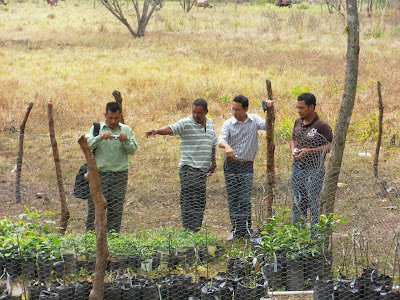The internet drought is finally over! Hurrah!!! For some reason my mobile internet stick wasn't connecting to the network properly for almost two weeks but it seems ok now. And so, the first order of business is to describe my new house. I can't believe I haven't posted any pictures yet so here they are. I guess this is just a little sneak peak for my parents and Julie since they'll be here to see it in person in about a week!
So, mi casa is about five minutes off the main road that runs through Catacamas. It's certainly not a very big house but that is totally fine with me considering I have to clean it! There is so much dust from the roads that I have to sweep every day and all the dishes need to be covered with tea towels. Right next door lives Doris, the administrative assistant for Diaconía’s Olancho office. Her house is pretty much a bigger version of my house and she lives there with her husband Noé and her children Pedro and Alejandra. It's nice having a family nearby, especially when Doris makes delicious soups and other treats.
 |
| The view of the yard from my back door. There are about three medium-sized mango trees and a few plantain trees too. |
 |
| My pila! |
I use the pila to wash my dishes and my clothes. Learning to do laundry was quite the experience and the first couple weeks I got friction burns on my palms. I buy a 5-gallon bottle of water about every two weeks for cooking and drinking. So far I haven't had many problems with the water. I did get a little sick for two days after accepting a coffee with milk from one of DN's micro-enterprise clients. All in all, it was pretty minor and totally normal for foreigners.
My house also has electricity which is great but it isn't always very reliable. Our power grid supports a lot of communities around Catacamas and it doesn't really have the capacity to meet all the demand. As a result, the lights often dim around supper time and sometimes the power cuts out completely for 30 minutes or more. When the power is eventually restored it sometimes sends an initial surge of electricity which can damage stereos, computers, photocopiers, etc.
The Diaconía office here in Olancho had to replace some of their equipment recently because of this type of wear and tear. It is possible that in the near future DN will need to submit a proposal to install a solar panel. This potential solution could offer more consistent electricity and support the development of sustainable energy sources. One of the things we are praying for is that Diaconía might find a partner organization to sponsor this solar panel project. Of course there are a lot of projects we would like to accomplish but I thought this one was especially intriguing!
 |
| A view of the mountains from my yard. |






